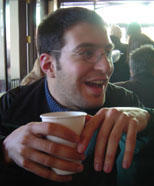Marc Kirschner Interview on NPR
Today, Marc Kirschner, head of the Systems Biology here at Harvard Medical school was interviewed on NPR's On Point program. There Prof Kirschner talked about his new book, The Plausibility of Life, evolution and what is the fabric of what he use to call evolvability. Click here to listen.

All I can say - great interview. Prof Kirschner made a couple of points that most other Scientists in the spot light fail to mention. He clearly states that there is Science and there is faith and the two should never be mixed up. He also states that Science should never be used to explain things that we do not understand, and that it is a great disservice to Science to claim that we have "all the answers".
He also talks about the great mystery of developmental biology - that actually there is not much difference at the genetic and cellular level between us and all other animals. To make an eye is not hard - most eyeless creatures have most of the building blocks (i.e. genes) to do it. It's actually easy to come up with intermediate eyes (and many of these intermediates exist in nature). And it's easy to see how the body can foster any change when things like eyes evolve. The body of multicelllular organisms is full of buffers and self organizing systems that permit these evolutionary changes, and the core components (genes) are almost universal and interchangeable. Infact the greatest mysteries in Biology escape the general public and the ID guys' imagination - how do these self-organizing principles work and how does a cell "work" (included in this second question is how do cells communicate). In the realm of evolution the biggest questions are how did life originate, how did the first (bacterial or prokaryotic) cell come about, and how did the first eukaryotic cell come about. Excluding consciousness and the mind, you can boil down 99% of the mysteries of "life" down to the cellular level. The rest (how to make limbs, eyes and) is infact trivial in comparison.

All I can say - great interview. Prof Kirschner made a couple of points that most other Scientists in the spot light fail to mention. He clearly states that there is Science and there is faith and the two should never be mixed up. He also states that Science should never be used to explain things that we do not understand, and that it is a great disservice to Science to claim that we have "all the answers".
He also talks about the great mystery of developmental biology - that actually there is not much difference at the genetic and cellular level between us and all other animals. To make an eye is not hard - most eyeless creatures have most of the building blocks (i.e. genes) to do it. It's actually easy to come up with intermediate eyes (and many of these intermediates exist in nature). And it's easy to see how the body can foster any change when things like eyes evolve. The body of multicelllular organisms is full of buffers and self organizing systems that permit these evolutionary changes, and the core components (genes) are almost universal and interchangeable. Infact the greatest mysteries in Biology escape the general public and the ID guys' imagination - how do these self-organizing principles work and how does a cell "work" (included in this second question is how do cells communicate). In the realm of evolution the biggest questions are how did life originate, how did the first (bacterial or prokaryotic) cell come about, and how did the first eukaryotic cell come about. Excluding consciousness and the mind, you can boil down 99% of the mysteries of "life" down to the cellular level. The rest (how to make limbs, eyes and) is infact trivial in comparison.


<< Home